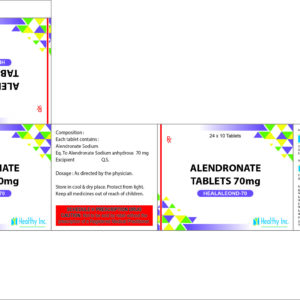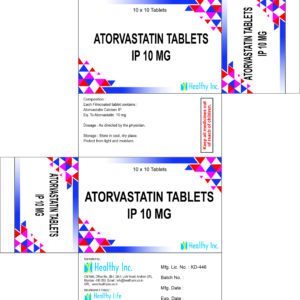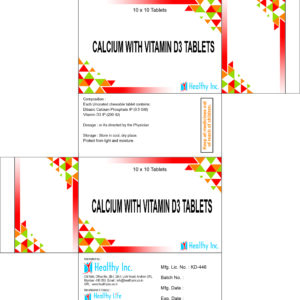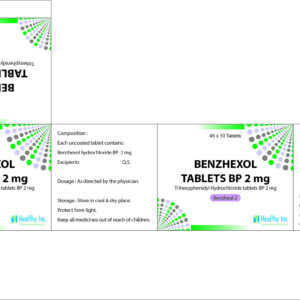Description
Warfarin Sodium Tablets (1mg / 2mg / 5mg)
Manufactured by Healthy Life Pharma Pvt. Ltd. | Exported by Healthy Inc
1. Product Introduction Healthy Life Pharma Pvt. Ltd. is a specialized manufacturer of Warfarin Sodium Tablets in India. This oral anticoagulant is a life-saving drug for preventing blood clots. Because Warfarin has a Narrow Therapeutic Index (NTI), we produce it with extreme precision. Our facility adheres to strict WHO-GMP standards to ensure exact dosage uniformity. Healthy Inc manages our global exports and hospital tenders.
2. Product Specifications | Parameter | Specification | | :— | :— | | Product Name | Warfarin Sodium Tablets | | Generic Name | Warfarin Sodium USP / BP / IP | | Strength | 1mg / 2mg / 3mg / 5mg / 10mg | | Dosage Form | Uncoated Scored Tablet | | Standard | USP / BP / IP Compliant | | Therapeutic Class | Anticoagulant / Blood Thinner | | Shelf Life | 36 Months | | Packaging | 10×10 Blister / 100s Bottle / 500s Bottle |
3. Manufacturing Warfarin Sodium Tablets We divide our operations to ensure specialized focus.
The Manufacturer: Healthy Life Pharma Pvt. Ltd. First, Healthy Life Pharma handles manufacturing. We operate a WHO-GMP certified plant in Mumbai. Warfarin is a potent drug where a small manufacturing error can be fatal. Therefore, we use Geometric Dilution techniques during blending. This ensures the active ingredient is perfectly distributed. We also use color-coding for different strengths (e.g., Pink for 1mg, Blue for 3mg) to prevent dispensing errors.
The Exporter: Healthy Inc Second, Healthy Inc manages international trade. This division handles logistics for Warfarin Sodium Tablets. We supply cardiac institutes and government health ministries. We understand the critical nature of keeping this drug in stock for patients. We ensure secure and temperature-controlled shipping.
4. Quality Assurance We test every batch rigorously.
Content Uniformity: We test individual tablets, not just the average. This ensures that every single tablet contains the exact dose.
Dissolution: We test how the tablet releases the drug. Consistent bioavailability is essential for maintaining a stable INR (International Normalized Ratio) in patients.
Hardness: We ensure tablets can be split easily if the doctor prescribes a half-dose.
5. Why Use Warfarin Sodium Tablets? This drug prevents the formation of harmful blood clots.
Mechanism: It inhibits Vitamin K epoxide reductase. Consequently, it reduces the body’s ability to make clotting factors.
Effect: It prevents clots from growing and stops new ones from forming.
Key Indications:
Prophylaxis and treatment of Deep Vein Thrombosis (DVT).
Prevention of Stroke in patients with Atrial Fibrillation (AF).
Prevention of Thromboembolism in patients with prosthetic heart valves.
Treatment of Pulmonary Embolism (PE).
6. Export and Regulatory Support We provide complete documentation for registration.
Dossier: We offer CTD and ACTD formats.
Certificates: We supply the Free Sale Certificate (FSC) and COPP.
Logistics: We ship via FOB Mumbai or CIF.
7. Frequently Asked Questions
Q: Who manufactures Warfarin Sodium Tablets? A: Healthy Life Pharma Pvt. Ltd. manufactures them in India.
Q: Do you use color coding? A: Yes, we manufacture color-coded Warfarin Sodium Tablets to match international standards for safety.
Q: Is this a high-risk drug? A: Yes, it is an NTI drug. We use specialized high-precision manufacturing protocols to ensure safety.
CLINICAL PHARMACOLOGY & SAFETY INFORMATION (For Registered Medical Practitioners & Patient Reference)
8. Dosage and Administration
Standard Dosage: Highly individualized based on the patient’s INR (International Normalized Ratio). Typical maintenance dose is 2mg to 10mg daily.
Monitoring: Regular blood tests (INR) are mandatory to adjust dosage.
Administration: Take at the same time every day, usually in the evening.
9. Side Effects and Precautions
Major Warning: The most serious side effect is bleeding (hemorrhage). Watch for unusual bruising, bleeding gums, or dark stools.
Dietary Note: Vitamin K affects how Warfarin works. Patients should keep their intake of green leafy vegetables consistent.
Contraindications: Pregnancy (Category X – causes birth defects), uncontrolled bleeding, or severe hypertension.
10. Storage Instructions
Store below 25°C in a dry place.
Protect from light and moisture.
Keep out of reach of children.








